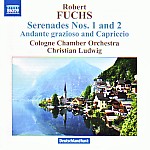Robert Fuchs (1847-1927) is best known today as the composition teacher of Mahler, Sibelius, Enesco, Korngold, Schreker, Zemlinsky, and just about everyone else who happened to be at the Vienna Conservatory from the late 19th century onward. As a composer he earned the respect of Brahms, probably because Brahms didn’t feel threatened by him, and was totally forgotten after his death. During his lifetime he was best known for his string serenades, two of which feature on this recording, along with the late (and quite substantial) Andante and Capriccio Op. 63.
Let’s get straight to the point: the music is wonderful–gracious, tuneful, not a note too long, and an unalloyed delight from first note to last. Yes, it’s not “heavy” or “serious”, but really, who cares? If you like Dvorák’s or Tchaikovsky’s string serenades, or Grieg’s Holberg Suite, or Sibelius’ Valse triste, then you are going to love this disc. The performances are perfect: flowing, rhythmically clean and snappy, immaculately tuned, and affectionately phrased. It just doesn’t get any better, and the sonics are pristine. The Viennese, of course, have always been suckers for light music, but that only made them particularly discerning. They went crazy for Fuchs. Check out this disc and find out why. [3/28/2011]
































